Confucius
Topic 1 Confucius 孔子

In educational practice, he created flexible teaching methods, promoting the combination of learning and thinking, learning and reviewing as well as teaching and learning. He emphasized on individualized and heuristic [hjuˈrɪstɪ k]启发式的teaching . These ideas are still of great significance in practice today.
相传他有弟子三千,其中七十二贤人。孔子去世后,其弟子 及其再传弟子把孔子及其弟子的言行语录和思想记录下来, 整理编成儒家经典《论语》。
As one of the greatest thinker, educator, philosopher and the founder of the Confucian school and Confucianism in the history of China, Confucius’ legacy [ˈleɡəsi]遗产 lies in the following three aspects:
700多年前,马可·波罗开辟了中意交往的先河,此后的利玛窦、郎世宁进一步拉近了 中意两国人民的距离。
A Brief Introduction
A Brief Introduction
Confucius (551 B.C—479 B.C.) is one of the most famous Chinese people. As the founder of Confucianism, his thought has exerted a deep influence
为什么孔子的英文名叫Confucius
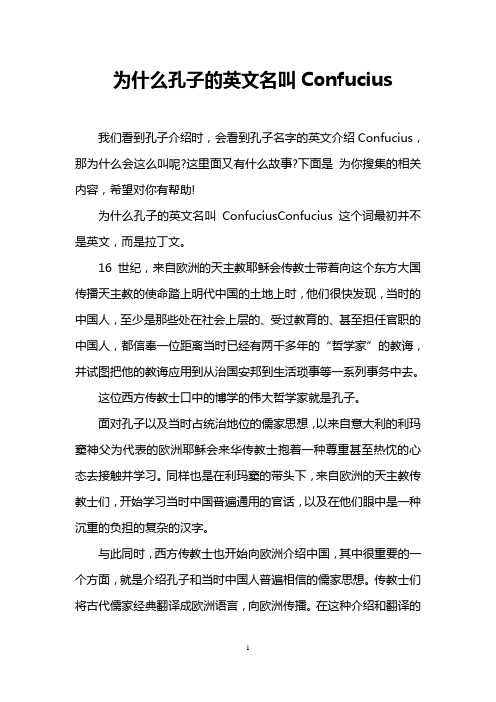
为什么孔子的英文名叫Confucius我们看到孔子介绍时,会看到孔子名字的英文介绍Confucius,那为什么会这么叫呢?这里面又有什么故事?下面是为你搜集的相关内容,希望对你有帮助!为什么孔子的英文名叫ConfuciusConfucius 这个词最初并不是英文,而是拉丁文。
16 世纪,来自欧洲的天主教耶稣会传教士带着向这个东方大国传播天主教的使命踏上明代中国的土地上时,他们很快发现,当时的中国人,至少是那些处在社会上层的、受过教育的、甚至担任官职的中国人,都信奉一位距离当时已经有两千多年的“哲学家”的教诲,并试图把他的教诲应用到从治国安邦到生活琐事等一系列事务中去。
这位西方传教士口中的博学的伟大哲学家就是孔子。
面对孔子以及当时占统治地位的儒家思想,以来自意大利的利玛窦神父为代表的欧洲耶稣会来华传教士抱着一种尊重甚至热忱的心态去接触并学习。
同样也是在利玛窦的带头下,来自欧洲的天主教传教士们,开始学习当时中国普遍通用的官话,以及在他们眼中是一种沉重的负担的复杂的汉字。
与此同时,西方传教士也开始向欧洲介绍中国,其中很重要的一个方面,就是介绍孔子和当时中国人普遍相信的儒家思想。
传教士们将古代儒家经典翻译成欧洲语言,向欧洲传播。
在这种介绍和翻译的过程中,就不免要翻译儒家创始人至圣先师孔子的名字。
罗马天主教会的官方语言一直以来都是继承自罗马帝国的拉丁语,随着时间的推移,古罗马时代使用的古典拉丁语在中世纪天主教会那里演变成了「教会拉丁语」,并一直使用到今天。
而拉丁语在当时的欧洲,特别是在欧洲学术界,也是沟通各个不同国家与文化的通用语言。
作为天主教圣职人员的利玛窦等耶稣会传教士,在翻译中国经典和中国人名、地名并向他们的欧洲同胞进行介绍的时候,使用的自然也就是教会拉丁语。
利玛窦选取了孔子比较流行的一个称呼孔夫子,将这个名字用音译的方式翻译成拉丁语。
明朝时期的汉语官话的发音与今天普通话发音的区别并不大,而孔夫子三字在明朝官话中的发音也基本上和今天的kǒngfūzǐ一样。
Confucius(孔子)
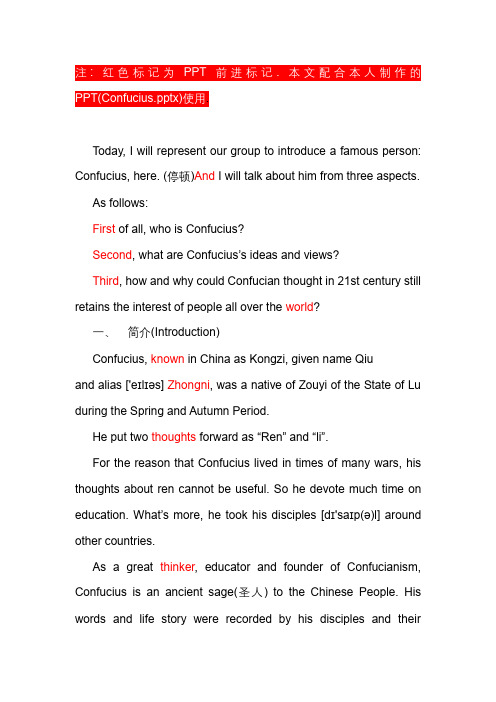
.Today, I will represent our group to introduce a famous person: Confucius, here. (停顿)And I will talk about him from three aspects.As follows:First of all, who is Confucius?Second, what are Confucius’s ideas and views?Third, how and why could Confucian thought in 21st century still retains the interest of people all over the world?一、简介(Introduction)Confucius, known in China as Kongzi, given name Qiuand alias ['eɪlɪəs] Zhongni, was a native of Zouyi of the State of Lu during the Spring and Autumn Period.He put two thoughts forward as “Ren” and “li”.For the reason that Confucius lived in times of many wars, his thoughts about ren cannot be useful. So he devote much time on education. What’s more, he took his disciples [dɪ'saɪp(ə)l] around other countries.As a great thinker, educator and founder of Confucianism, Confucius is an ancient sage(圣人) to the Chinese People. His words and life story were recorded by his disciples and theirstudents in The Analects ['ænəlekts].二、思想主张(Ideas and views)Ren and li are the two core concepts of Confucius’ doctrine about people.First: Li (主张“礼”):Confucius placed emphasis on li with the aim of preserving social order, stability and harmony. Therefore, the Analects says, “The role of li is to maintain harmony among people.” (礼之用,和为贵)Confucius ceremony, is not only the king's gift, the gift of father and son, but the gentleman unmoved attitude in the face of all. (礼的应用,以遇事做得恰当和顺为可)Second: Ren (主张“仁”):Confucius’s most important interpretation of Ren is“Love people”. This love is not only the universal love, furthermore, it should begin with the love for one’s parents. So he said: ”The greatest love for people is the love for one’s parents ”.(仁者,人也,亲亲为大)仁爱就是人的属性,将爱父母亲放在第一位。
Confucius(孔子)
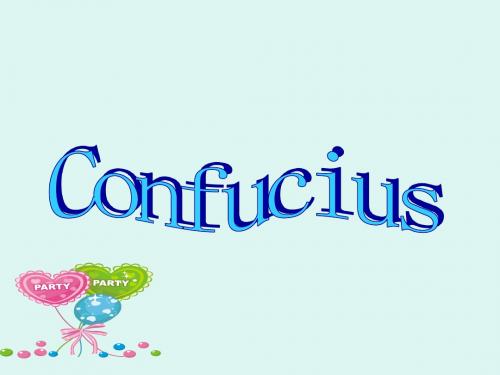
Confucius loves education career, devoting all his life to education activities. He is insatiable in learning. Not only teach by precept, but also do examples, in their own model behavior influence students. He loves his students, students also respect him very much, a harmonious relationship between teachers and students. He is a glorious and typical teacher of ancient China . Confucius' education activities not only has cultivated many students, but he put forward the practice of education theory, which lays the foundation of the ancient Chinese education
When Confucius was 3 years old, his father was die . under Yan ZhengZai’s education, He loved learning. Confucius had a difficulty youth. He aspired to learn at15. 30 years old, he was learned, become a famous scholar, and taught others, also creating a private school. His idea is “kindness", that is “to love“.
Confucius
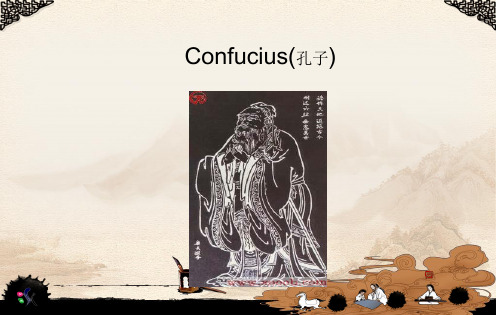
State of Lu
Confucius was the founder of Confucianism.He is fam ous for his philosophy. He was declared the "Extrem ely Sage Departed Teacher" (至聖先師). He is also known as the "Great Sage" (至聖), "First Teacher" (先師), and "M odel Teacher for Ten Thousand Ages" (萬世師表).
遗产名录》。
Confucius Institute
• Confucius Institute is not a general sense of the university but an institute to promote and disseminate [dɪ'semɪneɪt](传播 )Chinese culture and Chinese language established by Ministry of Education of the People's Republic of China.
子曰:“溫故而知新,可以為師矣。” The Master said, If a man keeps cherishing his old knowledge, so as continually to be acquiring new, he may be a teacher of others
பைடு நூலகம்
commemoration[kəˌmeməˌre ɪʃən]n.
孔子的简短介绍

孔子的简短介绍1.孔子简单的介绍孔子(前551-前479)英文名字:Confucius名丘,字仲尼,春秋后期鲁国人。
公元前551年9月28日(农历八月二十七日)生于鲁国邹邑昌平乡(今山东省曲阜市东南的鲁源村);公元前479年4月11日(农历二月十一日)逝世,享年72岁,葬于曲阜城北泗水之上,即今日孔林所在地。
他的祖先是宋国贵族,大约在孔子前几世就没落了。
孔子年轻时做过几任小官,但他一生大部分时间是从事教育,相传收弟子多达三千人,教出不少有知识有才能的学生。
春秋末期思想家、教育家,儒学学派的创始人,在世时已被誉为“天纵之圣”、“天之木铎”,是当时社会上最博学者之一,并且被后世尊为至圣(圣人之中的圣人)、万世师表。
因父母曾为生子而祷于尼丘山,故名丘,鲁国陬邑(今山东曲阜东南)人。
曾修《诗》、《书》,定《礼》、《乐》,序《周易》,作《春秋》。
孔子的思想及学说对后世产生了极其深远的影响。
2.孔子的简介孔子子姓,以孔为氏,名丘,字仲尼。
春秋时期鲁国陬邑昌平乡(今曲阜市南辛镇)人。
家中排行第二。
我国古代伟大文学家,思想家,政治家,教育家,社会活动家,古文献整理家,儒家学派创始人。
相传曾修《诗》《书》,订《礼》《乐》,序《周易》,作《春秋》。
他一生从事传道,授业,解惑,被中国人尊称“至圣先师,万世师表”。
后人把孔子的言行语录记录下来,作成《论语》。
在天道观上,孔子不否认天命鬼神的存在,但又对其持怀疑态度,主张“敬鬼神而远之”。
孔子与孟子并称“孔孟”,孔子被尊为“至圣”“素王”,曾子则为宗圣。
孟子为“亚圣”。
他的言行被他的学生写成创世巨作《论语》。
他还是世界最著名的文化名人。
成就孔子对后世影响深远,虽说他“述而不作”,但他在世时已被誉为“天纵之圣”、“天之木铎”、“千古圣人”,是当时社会上最博学者之一。
后世并尊称他为“至圣”(圣人之中的圣人)、“万世师表”,认为他曾修《诗》《书》,定《礼》《乐》,序《周易》(称《易经》十翼,或称易传),著《春秋》。
Confucius孔子(英文)
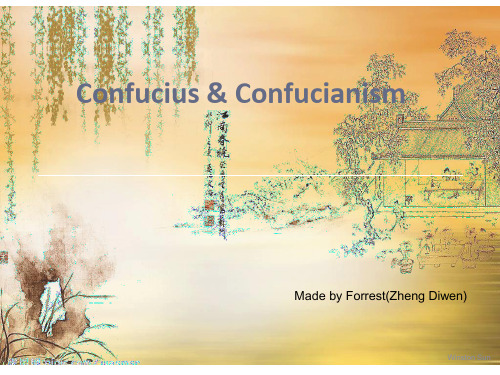
2
Winston Sun
Anthem
That’s where Confucius was born & spent most of his life.
The ancient state Lu
3
Winston Sun
Confucius
Thinker Educator Statesman Philosopher Founder of the Confucian school and Confucianism Symbol of Chinese culture
Confucius & Confucianism
Made by Forrest(Zheng Diwen)
Winston Sun
Confucius (Chinese: 孔子; pinyin: Kǒng zǐ )
2561 years old now(551–479 BC)
Lu not dine the ghost and god
Winston Sun
7
Winston Sun
Confucius Quotes
8
Winston Sun
GOLDEN RULE
Winston Sun
Influence in 17th Century Europe
For almost two thousand years, the Analects had also been the fundamental course of study for any Chinese scholar, for a man was not considered morally upright or enlightened if he did not study Confucius' works. The imperial examination, started in the Jin Dynasty and eventually abolished in late Qing Dynasty (early 20th century), emphasized Confucian studies and expected candidates to quote and apply the words of Confucius in their essays.
孔子简介

全国人大常委会原副委员长许嘉璐,文化 部副部长周和平,日本前内阁官房长官武村正 义与来自中国内地和香港、澳门、台湾地区以 及韩国、新加坡、马来西亚、美国、法国、英 国、比利时、丹麦、澳大利亚等22个国家和地 区、86个儒学研究机构的172位专家学者、各 界人士共襄盛举。这些来自不同国度、不同民 族、不同文化的专家学者、各界人士,围绕儒 学的历史研究、儒学的当代价值、儒学的现代 阐释、儒学的世界传播、儒学与和谐文化等议 题,进行了深入研讨与广泛对话。
据记载,孔子的祖先本是殷商后裔,故为子姓。周
灭商后,周武王封商纣王的庶兄,商朝忠正的名臣 微子启于宋(夏邑)。 微子启死后,其弟微仲即位, 微仲即为孔子的先祖。自孔子的六世祖孔父嘉之后, 后代子孙开始以孔为氏,其曾祖父孔防叔为了逃避 宋国内乱,从宋国逃到了鲁国。孔子的父亲叔梁纥 (叔梁为字,纥为名)是鲁国出名的勇士,叔梁纥 先娶施氏曜英,生九女而无一子,其妾生一子孟皮, 但有足疾。在当时的情况下,女子和残疾的儿子都 不宜继嗣。叔梁纥晚年与年轻女子颜征在再下孔子。 孔子的伟大思想与孔子母亲有很大关系,其母颜征 在和他的外祖父颜襄对孔子产生了深远影响,颜征 在的教学理念简直是先进了两千年。
孔子简介
孔子:子姓,以孔为氏,名丘,字仲尼。
“子”,古代对成年男子的尊称,在春秋战 国时期,拥有一定社会地位的成年男子都可 以称为“子”,而且都希望别人称自己为 “子”,因为“子”还是一种爵位,所谓 “公侯伯子男”也。但是,真正能获得别人 以“子”相称的,一般是两种人:要么在社 会上公信力较高的,如“老师”;要么就是 较有道德的贵族;孔子、老子属于前者。而 孔子是我国古代最伟大的政治家、思想家、 教育家和军事家。儒家学派创始人,世界最 著名的文学名人。与孟子并称“孔孟”,孔子
- 1、下载文档前请自行甄别文档内容的完整性,平台不提供额外的编辑、内容补充、找答案等附加服务。
- 2、"仅部分预览"的文档,不可在线预览部分如存在完整性等问题,可反馈申请退款(可完整预览的文档不适用该条件!)。
- 3、如文档侵犯您的权益,请联系客服反馈,我们会尽快为您处理(人工客服工作时间:9:00-18:30)。
Rén (仁, Humaneness) Yì(義, Righteousness or Justice) Lǐ (禮, Propriety or Etiquette) Zhì(智, Knowledge) Xì (信, Integrity). n
Zhōng (忠, Loyalty) Xiào (孝, Filial piety) Jié (節, Continency) Yì (義, Righteousness).
unto others what you would not have them do unto you."
Loyalty
Loyalty is the equivalent of filial piety on a different plane. It is particularly relevant for the social class to which most of Confucius' students belonged, because the only way for an ambitious young scholar to make his way in the Confucian Chinese world was to enter a ruler's civil service. Like filial piety, however, loyalty was often subverted by the autocratic regimes of China. Confucius had advocated a sensitivity to the realpolitik of the class relations in his time; he did not propose that "might makes right", but that a superior who had received the "Mandate of Heaven" (see below) should be obeyed because of his mபைடு நூலகம்ral rectitude.
Filial piety
The Five Bonds Ruler to Ruled Father to Son Husband to Wife Elder Brother to Younger Brother Friend to Friend
The gentleman
The term is crucial to classical Confucianism. Confucianism exhorts all people to strive for the ideal of a "gentleman" or "perfect man". A succinct description of the "perfect man" is one who "combines the qualities of saint, scholar, and gentleman." In modern times the masculine translation in English is also traditional and is still frequently used. Elitism was bound up with the concept, and gentlemen were expected to act as moral guides to the rest of society.
Ren
Ren is one of the basic virtues promoted by Confucius, and is an obligation of altruism and humaneness for other individuals within a community.Confucius' concept of humaneness is probably best expressed in the Confucian version of the ethic of reciprocity, or the Golden Rule: "Do not do
Confucianism
Personal cultivation (inside)
Politics (outside)
"If the people be led by laws, and uniformity sought to be given them by punishments, they will try to avoid the punishment, but have no sense of shame. If they be led by virtue, and uniformity sought to be given them by the rules of propriety, they will have the sense of the shame, and moreover will become good."
By Billy 矧犸
Most information come from Wikipedia , and ,of course, Billy’s mind.
Confucius (551–479 BCE) was a Chinese teacher, editor, politician, and philosopher of the Spring and Autumn Period of Chinese history.
There are still many other elements, such as Chéng (誠, honesty), Shù (恕, kindness and forgiveness), Lián (廉, honesty and cleanness), Chǐ (恥, shame, judge and sense of right and wrong), Yǒng (勇, bravery), Wēn (溫, kind and gentle), Liáng (良, good, kindhearted), Gōng (恭, respectful, reverent), Jiǎn (儉, frugal), Ràng (讓, modestly, self-effacing). Among all elements, Ren and Yi are fundamental.
Ethics
Relationships
Prince Father Teacher Minister Son Student
There is government, when the prince is prince, and the minister is minister; when the father is father, and the son is son.
Filial piety
"Filial piety" is considered among the greatest of virtues and must be shown towards both the living and the dead (including even remote ancestors). The term "filial" (meaning "of a child") characterizes the respect that a child, originally a son, should show to his parents. This relationship was extended by analogy to a series of five relationships.
